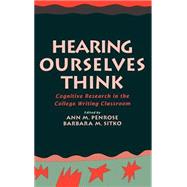
Note: Supplemental materials are not guaranteed with Rental or Used book purchases.
Purchase Benefits
What is included with this book?
| Introduction: Studying Cognitive Processes in the Classroom | p. 3 |
| Why Study Reading and Writing Processes in the Classroom? | p. 5 |
| Principles of Cognitive Process Theory | p. 8 |
| Issues for Classroom Research | p. 9 |
| The Advantage of the Research-Based Classroom | p. 13 |
| Interpreting Reading and Writing Tasks | |
| Beyond "Just the Facts": Reading as Rhetorical Action | p. 19 |
| Aspects of Reading: Insights from Theory and Research | p. 20 |
| The Act of Meaning Construction: Three Reading Strategies | p. 24 |
| Expanding Students' Views of Reading | p. 28 |
| Exploring the Relationship Between Authorship and Reading | p. 33 |
| How Reading Can Inform Writing | p. 34 |
| Examining How a Sense of Authorship Can Inform Reading | p. 37 |
| Teaching Students to Mine Texts | p. 42 |
| Writing and Learning: Exploring the Consequences of Task Interpretation | p. 52 |
| What We Know About Writing as a Way to Learn | p. 53 |
| Examining the Consequences of Task Interpretation | p. 57 |
| Helping Students Understand the Concept and Consequences of Task Interpretation | p. 62 |
| Reading to Argue: Helping Students Transform Source Texts | p. 70 |
| What We Know About Students' Experience with Written Argument | p. 70 |
| Transforming Sources into Arguments: Observing Writers' Reading and Note-Taking Strategies | p. 75 |
| Helping Students Transform Sources: Examining and Adapting the Reading and Note-Taking Strategies | p. 82 |
| The Library Revisited: Exploring Students' Research Processes | p. 102 |
| What Studies Tell Us About the Assumptions and Strategies That Guide Student Researchers | p. 103 |
| Observations of Student Researchers | p. 106 |
| Helping Students to Become More Critical, Reflective Researchers | p. 116 |
| Writing in Classroom Contexts | |
| Decision-Making During the Collaborative Planning of Coauthors | p. 125 |
| Moving Beyond the Theory and Research in Rhetoric and Composition to Explain Coauthoring | p. 128 |
| Decision-Making During Coauthors' Collaborative Planning | p. 133 |
| Introducing and Teaching Collaboration | p. 140 |
| Revising for Readers: Audience Awareness in the Writing Classroom | p. 147 |
| What We Know About Audience Awareness and Revision Processes | p. 147 |
| Putting Research into Practice: A Case Study of Revising for Readers | p. 155 |
| Helping Students Revise for Readers | p. 163 |
| Exploring Feedback: Writers Meet Readers | p. 170 |
| What Studies Tell Us About Feedback, Revising, and Interpretive Reading | p. 171 |
| Observing Writers Make Decisions About Revising After Feedback | p. 174 |
| Teaching Students How to Use Interpretive Reading to Revise | p. 177 |
| Using Conferences to Support the Writing Process | p. 188 |
| What We Know About Writing Conferences | p. 190 |
| Looking Closely at Conferences | p. 192 |
| Learning from Conferences in Your Classroom | p. 197 |
| Conducting Process Research | p. 201 |
| Index | p. 207 |
| Table of Contents provided by Syndetics. All Rights Reserved. |
The New copy of this book will include any supplemental materials advertised. Please check the title of the book to determine if it should include any access cards, study guides, lab manuals, CDs, etc.
The Used, Rental and eBook copies of this book are not guaranteed to include any supplemental materials. Typically, only the book itself is included. This is true even if the title states it includes any access cards, study guides, lab manuals, CDs, etc.